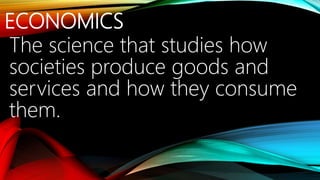
Economics.pptx
- 1. ECONOMICS The science that studies how societies produce goods and services and how they consume them.
- 2. ECONOMICS • Economic resources can be used to produce goods and services. • It has four categories: • Land • Labor • Capital • Entrepreneurship – the ability to organized other factor of production
- 3. ECONOMICS IN ITS BASIC FORM BEGAN DURING THE BRONZE AGE (4000-2500 BCE) WITH WRITTEN DOCUMENTS IN FOUR AREAS OF THE WORLD: •Sumer and Babylonia (3500-2500 BCE); •The Indus River Valley Civilization (3300-1030 BCE), in what is today’s Afghanistan, Pakistan, India; •The Yangtze River in China; • Egypt’s Nile Valley, beginning around 3500 BCE.
- 4. SOCIETIES IN THESE AREAS DEVELOPED NOTATION SYSTEMS USING MARKINGS ON CLAY TABLETS, PAPYRUS, AND OTHER MATERIALS TO ACCOUNT FOR CROPS, LIVESTOCK, AND LAND. •These accounting systems, arising in tandem with written language, eventually included methods for tracking property transfers, recording debts and interest payments, calculating compound interest, and other economic tools still used today.
- 5. • From the third millennium BCE onward, Egyptian scribes recorded the collection and redistribution of land and goods. • Sumerian traders developed methods to calculate compound interest over a period of months and years. The Code of Hammurabi (circa 1810–1750 BCE), the earliest work of economic synthesis, specifies norms for economic activity and provides a detailed framework for commerce, including business ethics for merchants and tradespeople.
- 6. •Economics is not the result of one person's ideas and theories. Instead, the field has been developed over centuries of experience, thought, and discussion.
- 7. THE FATHER OF MODERN ECONOMICS • Adam Smith a scottish thinker is widely credited with creating the field of modern economics. However, Smith was inspired by French writers publishing in the mid-18th century, who shared his hatred of mercantilism. • MERCANTILISM the first methodical study of how economies work was undertaken by the French physiocrats, notably Quesnay and Mirabeau. Smith took many of their ideas and expanded them into a thesis about how economies should work, as opposed to how they do work
- 8. •Smith believed that competition was self- regulating and governments should take no part in business through tariffs, taxes, or other means unless it were to protect free- market competition.
- 9. THE WEALTH OF NATIONS SMITH MASTERPIECE IN 1776 In this treatise, Smith laid out several mechanisms of capitalist production, free markets, and value. Smith showed that individuals acting in their own self-interest could, as if guided by an "invisible hand," create social and economic stability and prosperity for all.
- 11. THOMAS MALTHUS • Malthus was one of a group of economic thinkers of the late 18th and early 19th centuries who were grappling with the challenges of emergent capitalism following the French Revolution and the rising demands of a burgeoning middle class. • Among his peers were three of the greatest economic thinkers of the age, Jean-Baptiste Say, David Ricardo, and John Stuart Mill.
- 12. THOMAS MALTHUS •Malthus predicted that growing populations would outstrip the food supply. •He was proved wrong, however, because he didn't foresee technological innovations that would allow production to keep pace with a growing population. •Nonetheless, his work shifted the focus of economics to the scarcity of goods rather than the demand for them.
- 13. KARL MARX • The increased focus on scarcity led Marx to declare that the means of production were the most important components of any economy. • Marx took his ideas further and became convinced a class war would be sparked by the inherent instabilities he saw in capitalism. • Marx underestimated the flexibility of capitalism. Instead of creating a clear division between two classes—owners and workers—the market economy created a mixed class wherein owners and workers held the interests of both parties
- 14. KARL MARX •Marx accurately predicted one trend: businesses grow larger and more powerful to the degree that free- market capitalism allows.
- 15. KEYNES AND MACROECONOMICS • John Maynard Keynes developed a new branch of economics known as Keynesian economics, or macroeconomics. • Keynes styled the economists who had come before him as "classical" economists. He believed that while their theories might apply to individual choices and goods markets, they did not adequately describe the operation of the economy as a whole. • Keynesian macroeconomics presents the economy in terms of large-scale aggregates that represent the rate of unemployment, aggregate demand, or average price- level inflation for all goods
- 16. THE NEOCLASSICAL SYNTHESIS • By the mid-20th century, these two strands of thought— mathematical, marginalist microeconomics and Keynesian macroeconomics—would rise to near- complete dominance in the field of economics throughout the Western world. • This became known as the neoclassical synthesis, which has since represented mainstream economic thought. It is taught in universities and practiced by researchers and policymakers, with other perspectives labeled as heterodox economics.